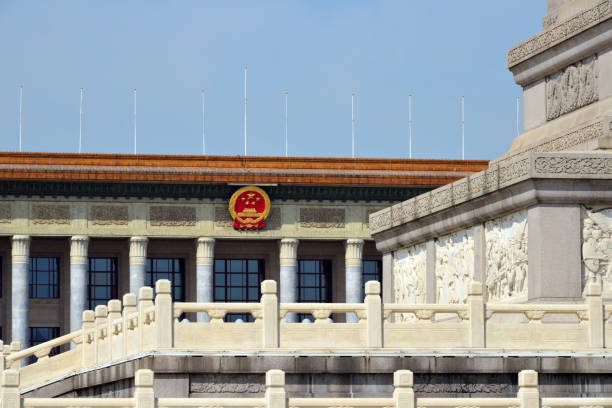[Reuters Breakingviews] China has yet to win the global power struggle

By Hugo Dixon
LONDON, Sept 14 (Reuters Breakingviews) - Back-to-back spectacles this month may have given the impression that Beijing’s superpower struggle with the United States is all but over. First, India’s Narendra Modi and Vladimir Putin of Russia held hands as they walked to meet Xi Jinping at the Shanghai Cooperation Organisation conference. Then China’s president projected the country’s military might at a parade in Beijing flanked by his Russian and North Korean counterparts.
Meanwhile, President Donald Trump has been depleting American power by bullying its friends and allies. That has undermined some sources of U.S. supremacy, such as its unrivalled network of alliances and its soft power.
But there is still a lot to play for. The United States has such a wealth of power that Trump will not be able to waste it all by the time he is due to leave office in 2029. Meanwhile, Beijing has its own weaknesses and its model lacks appeal to other countries. So, while other powers such as the European Union are weak, they too may yet find a way to exert their influence.
U.S. SOURCES OF POWER
American power is based on six main pillars: military might, alliances, a dynamic economy, technological innovation, the dollar’s role as the world’s reserve currency, and the attraction of the “U.S. model”.
China has been chipping away at these advantages for decades, narrowing the military, economic and technological gaps. Beijing has also gained influence by virtue of being the world’s biggest trading nation, its dominance of critical goods and its $1 trillion-plus Belt and Road Initiative, which has helped build infrastructure in multiple countries.
Since Russia’s invasion of Ukraine, Xi has developed an increasingly close relationship with Putin, helping sustain Russia’s war effort. The two leaders are united in wanting to break American hegemony.
Meanwhile, Washington has suffered self-inflicted wounds since Trump returned to the White House in January. His tariffs may be pushing the U.S. economy into recession, his tax cuts will add trillions of dollars to the federal government’s already high debt and his policies are undermining the dollar.
The U.S president’s trade wars have also antagonised allies such as Canada and most of Europe. Tariffs have pushed India closer to China, while the Trump administration’s mass arrest of about 300 South Korean workers has strained relations with Seoul and spooked other companies planning big investments in the U.S.
Trump’s flip-flopping over support for Ukraine has caused anxiety among European allies, which view Kyiv’s security as vital to their own. Equally, his ambiguous statements about Taiwan have sowed doubt over whether he would oppose a Chinese invasion of the island.
What is more, the more Trump embraces authoritarian policies at home, the harder it is for the U.S. to claim it is a champion of democracy. Much of the world is unhappy that his administration has abandoned the fight against climate change, has slashed foreign aid and is supporting Israel’s war in Gaza.
Yet while the charge sheet against Trump is long, the U.S. remains a much bigger economy, with GDP of $29 trillion compared to China’s $19 trillion. Washington still has a military and technological edge over Beijing. And though its European and East Asian allies are unhappy, they are not going to desert the U.S. while they feel threatened by Russia and China.
CHINA’S VULNERABILITIES
At the same time, China’s onward charge masks some serious weaknesses. For many years the People’s Republic propped up growth by investing in projects with little or no financial return. That led to a massive expansion in credit, which grew to 287% of output in 2024 from 113% in 2008, according to the Bank for International Settlements. Some of the borrowing has now gone sour and the economy is slowing.
China is also addicted to exports. While it has cut its dependence on the U.S., the corollary is that it is selling more goods elsewhere. Other countries are now worried about Beijing dumping products like electric cars and solar panels on their markets.
The country also faces a severe demographic transition. Its population will fall 12% by 2050, compared with a 9% rise in the U.S., the World Bank forecasts. And there is huge uncertainty about who will replace Xi. Meanwhile, the Chinese model of working hard, consuming little and toeing the Communist Party line has limited appeal for citizens in other countries.
To be sure, Xi’s insistence that governments should not interfere in the internal affairs of other countries is attractive to autocrats elsewhere. But even other strongmen are wary of becoming dependent on China.
India, the world’s most populous nation and fifth largest economy, is the most important case. Prime Minister Narendra Modi made a public display of his friendship with Xi after Trump hit India with punitive tariffs. But New Delhi and Beijing have a long-running history of border disputes. Modi will not want to be in Xi’s camp. The Indian and U.S. leaders put out social media posts last week suggesting they were working on a deal.
MIDDLE POWERS’ MOMENT?
Could this then be a moment when so-called “middle powers” can exert their influence, independently of both Washington and Beijing? While there are certainly opportunities for them to club together without the superpowers, it will not be easy for those whose security is at risk.
Take the EU. It cannot afford to let Russia defeat Ukraine – and to achieve that it is desperate for Washington to keep providing Kyiv with at least some support. So despite Trump’s bullying, it agreed a one-sided trade deal with the United States and promised to roughly double its defence spending.
Indeed, the Ukraine war will go a long way towards determining the global balance of power. A victory for Russia will be a win for China and a loss for the U.S. But if Ukraine avoids defeat, Europe will get a shot in the arm. It may also gain some autonomy from the United States, particularly if it builds up its defences.
Pax Americana may be waning. But the future may not be Pax Sinica either.
Follow @Hugodixon on X
Chinese debt has almost trebled in the past two decades

China’s economic catch-up with the United States has stalled









